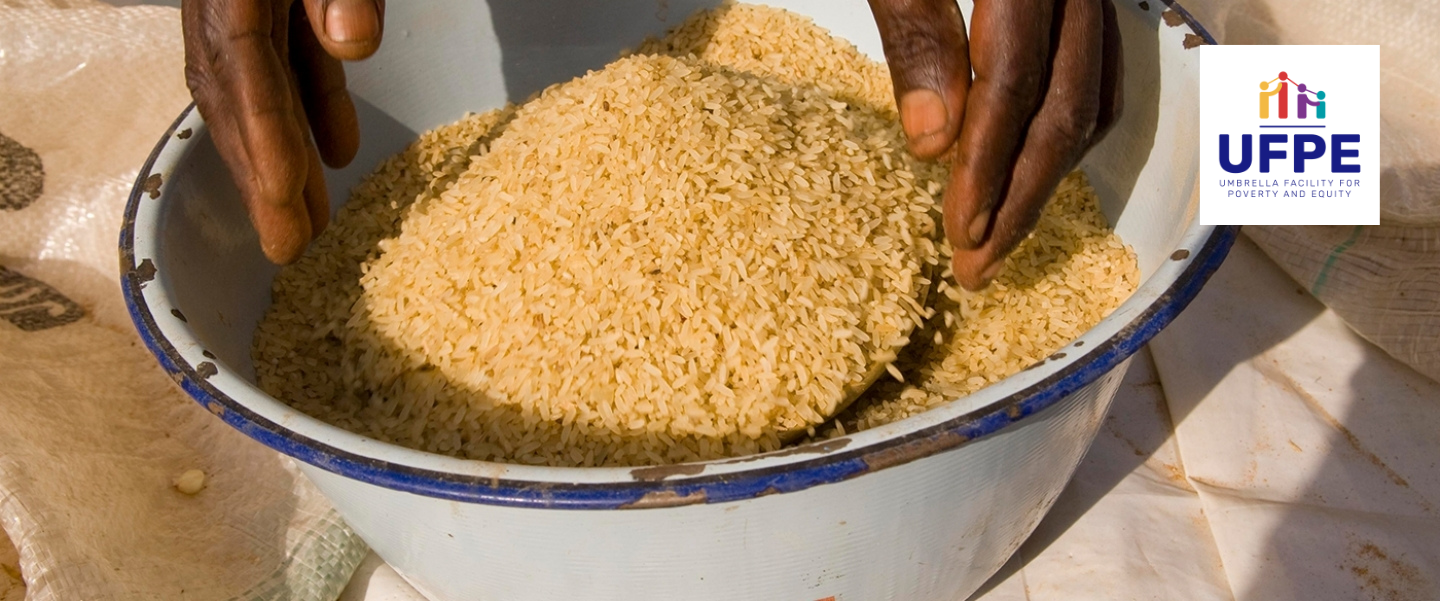Approach
The UFPE achieves impact by turning data and evidence into decisions that improve people’s lives, with a focus on the poorest and most vulnerable. The UFPE supports top-tier policy-relevant analysis, tools, advice, and capacity building, that is anchored in high-quality data and strong data systems.
The Umbrella Fund for Poverty and Equity works across three main pillars:
1) Data for Poverty and Equity-Informed Policy
2) Analysis for Poverty and Equity-Informed Policy
3) Operational Effectiveness for Poverty Reduction and Equity
Pillar 1 and Pillar 2 build the evidence base for policies and programs to promote poverty reduction and equity through investments in data and analysis. Pillar 3 maximizes operational effectiveness through investments in targeting and monitoring tools and applying behavioral insights for policy and program design and implementation. Cross-cutting themes include gender, green recovery, climate change, digital inclusion, and capacity building.

Our Pillars

Pillar 1 - Data for Poverty and Equity-Informed Policy
The availability of timely, relevant, and good-quality data is critical for effective and efficient decision making, resource allocation, and service delivery. Data are crucial to knowing where a country stands in terms of social and human development and to assess the challenges ahead.
Data are also needed to understand which policies are effective for pro-poor and equitable economic growth and addressing social deprivations. Across countries, comparable data are also needed to monitor progress toward the eradication of extreme poverty and, more broadly, the achievement of the Sustainable Development Goals.
Example focus areas include modernization and capacity building of national statistical systems to be fit-for-purpose for the data revolution - including support to the IDA20 Data for Policy Initiative - bringing visibility to invisible and vulnerable groups through the production, use, and dissemination of data, and innovating global welfare measurement and monitoring.
Pillar 2 - Analysis for Poverty and Equity-Informed Policy
Understanding who the poor and vulnerable are, where they live and work, and how they are affected by markets, institutions, risks, and government action is critical to designing policies and programs that tackle the root causes of poverty and inequality in a sustainable way.
Building a robust evidence base for poverty and equity-informed policy is critical to ensuring that policies and programs seek to improve well-being in society. For this purpose, the UFPE supports analysis to understand the macro-and microeconomic drivers of and constraints to poverty reduction and equity and assess the distributional impacts of selected policies, programs and shocks to make policies work better for the poor and vulnerable.
Example focus areas of distributional analysis include taxes and expenditures, private sector development and competition, infrastructure, trade, spatial transformation, labor markets, fragility and conflict, and climate shocks.
Pillar 3 - Operational Effectiveness for Poverty Reduction and Equity
The success of development policies and programs depends as much on successful implementation as it does on design. Policies and programs may fall short of their intended impact due to behavioral barriers that undermine effective implementation or limit beneficiary uptake of intended outcomes. Similarly, imperfect alignment between objectives and resources and implementation bottlenecks, particularly in the early stages of policy or program rollout, can hinder performance and, ultimately, compromise impact.
Mainstreaming tools and approaches that can help address behavioral, targeting, and implementation challenges for World Bank and government interventions could have significant payoffs in terms of enhanced operational effectiveness for poverty reduction and equity. In this context, the UFPE supports the application of behavioral insights for program design and implementation and tools for improved targeting and monitoring of policies and programs with a poverty and equity focus.
Example focus areas include the application of behavioral insights for program and policy design and implementation and real-time monitoring and operational tools to target and evaluate poverty and equity impacts at different stages of the country engagement cycle.

How we work
The Umbrella Facility for Poverty and Equity (UFPE) is the first global trust fund to support the cross-cutting poverty and equity agenda with an agile, multi-stakeholder approach, supporting both bank-executed and recipient-executed activities at the country, regional, and global levels.
Global activities focus on the creation of policy-relevant global public goods, while regional and country activities focus on bringing a poverty and equity lens to operational and policy engagements.
Our approach to maximize the impact of the work being done across the World Bank to end extreme poverty, boost shared prosperity and fulfill the Sustainable Development Goals is ambitious, collaborative, and evidence-based.
